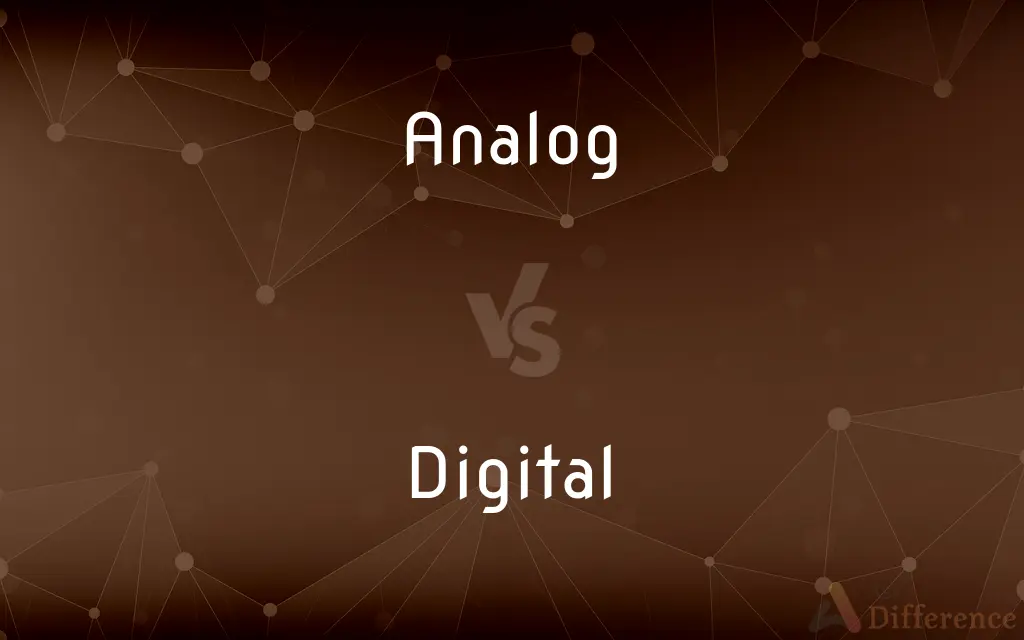Analog vs. Digital — What's the Difference?
By Tayyaba Rehman — Updated on September 15, 2023
"Analog" relates to continuous signals or systems, while "digital" pertains to discrete signals or systems represented by numbers.

Difference Between Analog and Digital
Table of Contents
ADVERTISEMENT
Key Differences
"Analog" systems or signals are continuous in nature. They're represented by varying quantities, such as the vinyl records' grooves or the continuous sweep of a clock's second hand. On the contrary, "digital" systems operate using discrete values. Examples of this include the binary code (0s and 1s) that computers utilize or a digital clock displaying numbers.
In the "analog" world, data is translated into electric pulses of varying amplitude. This means that analog devices can be susceptible to noise which can degrade the signal quality. In the "digital" realm, data is translated into binary code, offering more accuracy as the system can regenerate the original data even if noise interferes, up to a certain point.
One primary distinction between "analog" and "digital" is how they handle data or information. Analog devices record waveforms as they are, with all their intricacies. In contrast, digital devices convert these waveforms into a limited set of numbers and represent the information.
Lastly, as technology has evolved, many traditionally "analog" devices have seen digital counterparts emerge. For instance, while analog watches use hands to show time, digital watches display time in numerals. Both systems have their advantages and disadvantages in various applications.
Comparison Chart
Nature
Continuous
Discrete
ADVERTISEMENT
Representation
Varying quantities like voltage
Binary code (0s and 1s)
Susceptibility to Noise
More susceptible
Less susceptible; can regenerate original signal
Accuracy
Can degrade over distance or time
Maintains accuracy if noise is below a threshold
Examples
Vinyl records, analog watches
CDs, digital clocks
Compare with Definitions
Analog
Operating with a range of continuous possibilities.
Analog devices often operate based on a spectrum of values.
Digital
Relating to or using signals or information represented by discrete numbers.
Digital systems, like computers, process information in binary form.
Analog
Relating to or using continuously varying values or signals.
The analog clock on the wall has hands that move in a continuous motion.
Digital
Involving or relating to the use of computer technology.
The digital revolution has transformed the way we communicate.
Analog
Not digital; involving data in the form of continuous physical quantities.
Analog audio systems use tapes to record sound.
Digital
Representing data as a series of numbers.
A digital photo translates the image into pixels, each with numeric values.
Analog
Something that bears an analogy to something else; something that is comparable
“Titan, Saturn's giant moon … seems like an analog of the environment of Earth on the eve of life” (David Grindspoon).
Digital
Using alphanumeric characters, especially binary codes.
Digital storage devices keep data in a format that machines can read.
Analog
(Biology) An organ or structure that is similar in function to one in another kind of organism but is of dissimilar evolutionary origin.
Digital
Displaying information using characters, especially numerals.
The digital display of the microwave shows the countdown time.
Analog
(Chemistry) A structural derivative of a parent compound that often differs from it by a single element.
Digital
Relating to or resembling a digit, especially a finger.
Analog
Of, relating to, or being a device in which data or a signal is represented by continuously variable, measurable, physical quantities, such as length, width, voltage, or pressure.
Digital
Operated or done with the fingers
A digital switch.
Analog
Done, happening, or existing in the physical world rather than on an electronic device
Analog strategy games.
Analog friendships.
Digital
Having digits.
Analog
(of a device or system) In which the value of a data item (such as time) is represented by a continuous(ly) variable physical quantity that can be measured (such as the shadow of a sundial).
An analog watch
Digital
Expressed in discrete numerical form, especially for use by a computer or other electronic device
Digital information.
Analog
Not relating to, or pre-dating, digital technology such as computers and the Internet; relating to real life.
An analog (paper) map
Digital
Relating to or being a device that can generate, record, process, receive, transmit, or display information that is represented in discrete numerical form.
Analog
(countable) Something that bears an analogy to something else.
Digital
Relating to or being a service that provides information expressed in discrete numerical form
We subscribe to digital cable.
Analog
An organ or structure that is similar in function to one in another kind of organism but is of dissimilar evolutionary origin.
Digital
Relating to or being a profession or activity that is performed using digital devices
A digital librarian.
Digital photography.
Analog
(chemistry) A structural derivative of a parent compound that differs from it by only one or a few atoms or substituent groups; (usually, especially) such a molecule that retains most of the same chemical properties.
Insulin analogue
Digital
Using or giving a reading in digits
A digital clock.
Analog
Something having the property of being analogous to something else
Digital
Characterized by widespread use of computers
Living in the digital age.
Analog
Of a circuit or device having an output that is proportional to the input;
Analogue device
Linear amplifier
Digital
A key played with the finger, as on a piano.
Analog
Representing information by variation of a continuous physical property.
The grooves on a vinyl record are an analog representation of sound.
Digital
Having to do with digits (fingers or toes); performed with a finger.
Analog
Being a direct and continuous representation of data.
The thermometer provides an analog readout of the temperature.
Digital
Property of representing values as discrete, often binary, numbers rather than a continuous spectrum.
Digital computer
Digital clock
Digital
Of or relating to computers or the Information Age.
Digital payment systems are replacing cash transactions.
Digital
(finance) A digital option.
Digital
(uncountable) Digital equipment or technology.
He moved to digital for the first time, using a Sony camera.
Digital
(music) Any of the keys of a piano or similar instrument.
Digital
A finger.
Digital
Of or pertaining to the fingers; done with the fingers; as, digital compression; digital examination.
Digital
Of or pertaining to digits{3}; expressed in digits{3}, or using digits{3}; as, a digital display; a digital clock.
Digital
Performing internal logical and arithmetic operations by means of digits, usually represented as binary numbers. Contrasted to analog, wherein variables are represented as coninuous physical quantities such as voltages or the position of a pointer on a continuous scale; as, a digital computer.
Digital
Of a circuit or device that represents magnitudes in digits;
Digital computer
Digital
Displaying numbers rather than scale positions;
Digital clock
Digital readout
Digital
Relating to or performed with the fingers;
Digital examination
Common Curiosities
Are vinyl records analog or digital?
Vinyl records are analog.
Why are most modern devices digital?
Digital devices can process and store data more efficiently and are less prone to noise.
Is analog always inferior to digital?
Not necessarily; each has its advantages depending on the application.
Can digital signals be converted to analog?
Yes, using a digital-to-analog converter (DAC).
Is there a way to convert analog signals to digital?
Yes, using an analog-to-digital converter (ADC).
What's an example of an analog system in nature?
Human hearing, as our ears perceive continuous sound waves.
Can analog and digital systems coexist?
Yes, many systems, like hybrid watches, combine both analog and digital components.
Which system is more prone to interference or noise?
Analog signals are generally more susceptible to noise and degradation.
Are there any advantages to using analog systems in today's digital age?
Yes, in certain applications like music or certain types of communication, analog can offer benefits.
Are all computer systems digital?
Yes, modern computers process and store information digitally.
Why do some audiophiles prefer analog sound?
Some believe analog provides a warmer and more natural sound than digital.
What does binary code in digital systems represent?
Binary code represents data using two symbols, typically 0s and 1s.
Share Your Discovery

Previous Comparison
Deontology vs. Teleology
Next Comparison
Outline vs. OverviewAuthor Spotlight
Written by
Tayyaba RehmanTayyaba Rehman is a distinguished writer, currently serving as a primary contributor to askdifference.com. As a researcher in semantics and etymology, Tayyaba's passion for the complexity of languages and their distinctions has found a perfect home on the platform. Tayyaba delves into the intricacies of language, distinguishing between commonly confused words and phrases, thereby providing clarity for readers worldwide.
















































